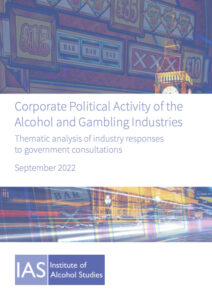View this report

Background
There is growing evidence that unhealthy commodity industries (UCIs) use the same strategies to influence policy decisions in line with their commercial interests. For example, studies regarding the tobacco and alcohol industries’ corporate political activity (CPA) have shown that misrepresenting evidence of harm and emphasising ‘individual responsibility’ are common strategies to subvert policy. The gambling industry has received comparatively less attention, but is rapidly gaining traction as a public health concern.
Parallels have been drawn between the alcohol and gambling industries in terms of patterns of consumption, harms caused by consumption, regulatory approaches available and a generally ‘liberal’ set of laws governing these industries in the UK. However, there are very few studies comparing CPA across UCIs.
To address this gap, this study will look at alcohol and gambling industries responses to two UK government consultations:
- The House of Lord (HoL) inquiry into to the Alcohol ‘Licensing Act 2003: post-legislative scrutiny’ (carried out in 2016)
- The HoL inquiry into the ‘Social and Economic Impact of the Gambling Industry’ (carried out in 2019).
Both are recent inquiries, following a similar format and gathered insight into successes and shortcomings of current Alcohol and Gambling Acts in England, related regulation and other issues. This makes the two inquiries suitable for comparison.
Methods
The aim of this study was to compare and contrast strategies, arguments and framings used in alcohol and gambling industries responses to UK government consultations. Industry responses to the inquiries (taken from the UK parliament website) were identified using pre-determined inclusion/exclusion criteria, and downloaded into Nvivo 12. Responses were analysed using (a mainly inductive) thematic analysis. Themes in the frames, arguments and strategies used by the alcohol and gambling industries in CPA were compared. Themes were organised into two overarching frames:
- How the problem is framed
- How the solution is framed
Results
19 of the 161 written responses (~12%) and 28 of the 98 written responses (~29%) submitted to the HoL inquiry into the ‘Licensing Act 2003’ (2016/17) and ‘Social and Economic Impact of the Gambling Industry’ (2019/20) respectively were identified as industry responses (excluding supplementary written responses).
Thematic analysis revealed both industries largely used the same framing of the problem of alcohol and gambling harms, and their solutions. Alcohol industry and gambling industry actors framed the problem of alcohol/ gambling similarly, emphasising harms were only experienced by a minority of people while the majority drink/gamble responsibly. Deflecting the problem to other industry actors was also common in both industries, as was downplaying the issue (e.g. by claiming alcohol use disorders/problem gambling prevalence is low, or pointing out flaws in gambling research).
This included arguing that harms are only experienced by a ‘minority’ of people, emphasising individual responsibility and shifting blame for harms to other industry actors, e.g. from on-trade alcohol retailers to off-trade and on-shore gambling operators to offshore (online) operators. This led into promoting solutions favoured by the industry e.g. targeted or localised solutions (in place of more effective population level solutions) and emphasising harms of introducing regulation not in the industries’ interest.
Conclusions
Consistent with previous literature, this study shows that UCIs use the same arguments and framings to shape the narrative around their harms, and solutions to those harms. This study also identified novel strategies:
- Alcohol and gambling industries shifting blame of harms to other industry actors in their same industries, and other UCIs
- Exploitation of a supposed ‘dearth’ of evidence as a strategy to downplay harms or delay action in the field of gambling
This study supports calls to move away from framing the problem of alcohol and gambling harms as one of ‘individual responsibility’, experienced by only a minority.
Understanding commonalities in strategies used by industries may help to inform more effective, unified public health responses across all UCIs. These findings highlight the importance of policy makers being aware of these strategies to avoid undue industry influence on policy decisions.
View this report
